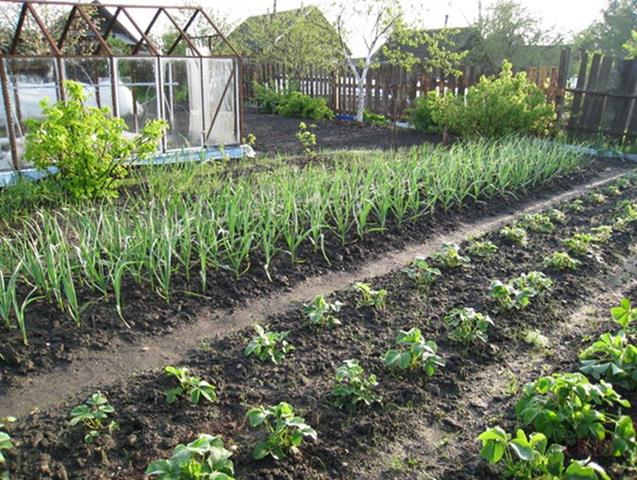Composting plays a crucial role in successful vegetable gardening, offering a multitude of benefits that contribute to healthier plants and higher yields. In this article, we will delve into the advantages of composting in vegetable gardening, exploring how this sustainable practice can transform your gardening experience.
What are the advantages of composting in vegetable gardening? Composting is a natural process that involves decomposing organic materials to create nutrient-rich soil. This process not only enhances the quality of the soil but also helps improve its structure, drainage, and aeration – all essential for growing thriving vegetables.
Moreover, composting is a sustainable practice that reduces waste by recycling organic materials back into the earth. By diverting kitchen scraps and yard waste from landfills, composting promotes eco-friendly practices and minimizes greenhouse gas emissions. Additionally, utilizing compost in your vegetable garden can eliminate the need for expensive fertilizers and soil amendments, making it a cost-effective solution for maintaining healthy soil.
What Is Composting
Composting is a natural process that involves the decomposition of organic matter to create nutrient-rich soil. This process is crucial in vegetable gardening as it helps replenish the soil with essential nutrients, promote healthy plant growth, and improve overall soil structure. Compost can be made from a variety of materials such as kitchen scraps, yard waste, grass clippings, and leaves. These materials are broken down by microorganisms like bacteria, fungi, and earthworms in a compost pile or bin.
There are several key advantages of composting in vegetable gardening that make it an essential practice for any gardener. One of the main benefits is that composting enriches the soil with vital nutrients such as nitrogen, phosphorus, and potassium. These nutrients are essential for plant growth and development, leading to healthier and more productive vegetable plants. In addition to providing nutrients, compost also improves soil structure by increasing its ability to retain moisture and nutrients.
Furthermore, composting is a sustainable practice that helps reduce waste by recycling organic materials that would otherwise end up in landfills. By diverting organic waste from landfills, gardeners can help reduce greenhouse gas emissions and promote eco-friendly gardening practices.
Additionally, using compost in vegetable gardens can save money on fertilizers and soil amendments, making it a cost-effective solution for maintaining healthy soil quality. Overall, incorporating composting into vegetable gardening not only benefits the environment but also enhances plant health and yields.
Nutrient-Rich Soil
Composting plays a crucial role in improving soil quality for vegetable gardening by providing essential nutrients that support plant growth and health. As organic matter decomposes in a compost pile, it breaks down into valuable nutrients such as nitrogen, phosphorus, potassium, and other micronutrients vital for plant development. These nutrients are then slowly released into the soil, creating a rich and fertile environment ideal for growing vegetables.
Enhanced Soil Structure
In addition to providing essential nutrients, composting also helps improve the overall structure of the soil. As compost is added to the garden bed or mixed into existing soil, it increases the soil’s ability to retain moisture and allows for better drainage. This improved soil structure creates an optimal growing environment for vegetable plants, ensuring they have access to water and oxygen while also promoting healthy root development.
Beneficial Microorganisms
Another advantage of composting in vegetable gardening is the introduction of beneficial microorganisms to the soil. These microorganisms help break down organic matter further, releasing additional nutrients that plants can absorb. They also play a crucial role in suppressing harmful pathogens that can cause diseases in vegetable plants. By incorporating compost into the garden soil, vegetable gardeners can create a diverse and thriving ecosystem that supports plant growth while naturally reducing the risk of pests and diseases.
Overall, the nutrient-rich soil created through composting provides a solid foundation for successful vegetable gardening. By utilizing compost in their gardens, vegetable growers can ensure their plants receive all the necessary nutrients for healthy growth, improve soil structure and drainage, introduce beneficial microorganisms, reduce reliance on chemical fertilizers, and promote sustainable gardening practices.
Whether you are a novice gardener or an experienced green thumb, incorporating composting into your vegetable gardening routine can lead to bountiful harvests and thriving plants year after year.
Sustainability
Composting plays a significant role in promoting sustainability within vegetable gardening practices. By composting organic waste materials, gardeners can effectively reduce the amount of waste that ends up in landfills. This practice not only helps decrease the greenhouse gas emissions associated with rotting organic matter but also minimizes the need for chemical fertilizers in vegetable gardening. In essence, composting contributes to a more eco-friendly and environmentally conscious approach to cultivating vegetables.
One of the key advantages of composting in vegetable gardening is its ability to close the nutrient cycle within the garden ecosystem. Through composting, organic matter is broken down into nutrient-rich humus, which can then be added back into the soil.
This process enriches the soil with essential nutrients like nitrogen, phosphorus, and potassium, creating an optimal environment for healthy plant growth and development. As a result, vegetable plants grown in compost-amended soil tend to be more robust, productive, and resilient to environmental stressors.
Furthermore, composting fosters biodiversity in the garden by supporting beneficial microorganisms that improve soil structure and fertility. These microorganisms aid in breaking down organic matter and making essential nutrients more accessible to plant roots. By maintaining a thriving microbial community through composting, vegetable gardeners can enhance soil health and productivity over time. Ultimately, embracing composting as a sustainable practice yields numerous long-term benefits for both vegetable crops and the environment as a whole.
| Advantages of Composting | In Vegetable Gardening |
|---|---|
| Reduces waste going to landfills | Creates nutrient-rich soil |
| Promotes eco-friendly practices | Supports biodiversity in the garden |
Cost-Effective Gardening
Composting in vegetable gardening not only benefits the environment but also proves to be a cost-effective practice. By utilizing compost in your garden, you can significantly reduce the need for expensive fertilizers and soil amendments. Compost is rich in essential nutrients like nitrogen, potassium, and phosphorus, which are vital for the healthy growth of vegetables. Instead of purchasing these nutrients separately, creating your own compost allows you to improve soil fertility without breaking the bank.
Reduced Dependence on Commercial Fertilizers
One of the primary advantages of composting in vegetable gardening is that it reduces your dependence on commercial fertilizers. Many store-bought fertilizers can be costly and often contain synthetic chemicals that may harm the environment over time.
By using compost as a natural alternative, you are not only saving money but also avoiding potential negative impacts on soil health and water quality. Additionally, compost releases nutrients slowly into the soil, providing a steady food source for your plants throughout their growth cycle.
Saving Money on Soil Amendments
In addition to fertilizers, gardeners often need to invest in various soil amendments to improve soil structure and moisture retention. Compost acts as a multi-functional amendment that can help loosen compacted soil, promote drainage, and increase water-holding capacity – all without requiring separate purchases.
By integrating compost into your vegetable garden beds regularly, you can save money on additional soil amendments while nurturing a more diverse and balanced ecosystem underground. Ultimately, cost-effective gardening through composting allows you to reap financial savings while fostering healthier and more productive vegetable plants.
Pest and Disease Control
Composting plays a crucial role in pest and disease control in vegetable gardening. By creating nutrient-rich soil through the composting process, gardeners can promote healthy plant growth that is more resistant to pests and diseases. Here are some ways in which composting can help prevent these common problems in vegetable gardens:
- Improves Soil Health: Compost adds essential nutrients to the soil, creating a balanced ecosystem where plants can thrive. Healthy plants are naturally more resilient to pests and diseases.
- Increases Beneficial Microorganisms: Compost is teeming with beneficial microorganisms that help break down organic matter and protect plants from harmful pathogens. These microorganisms outcompete plant-damaging organisms, reducing the risk of infestations.
- Strengthens Plant Immune Systems: The nutrients and organic matter provided by compost support strong root systems and overall plant health. When plants are well-nourished, they have stronger immune systems that can fend off attacks from pests and diseases.
In addition to these direct benefits, composting also indirectly contributes to pest and disease control by promoting overall garden health and balance. By avoiding the use of chemical fertilizers that can harm beneficial insects or disrupt the natural ecosystem of the garden, composting helps maintain a sustainable environment where plants can thrive without relying on synthetic inputs.
Overall, incorporating composting into vegetable gardening practices not only improves soil quality but also acts as a shield against potential pest infestations and disease outbreaks. By harnessing the power of nature through composting, gardeners can create a resilient and healthy growing environment for their vegetables while reducing the need for potentially harmful chemical interventions.
Increased Yield
Composting plays a significant role in increasing vegetable yields in gardening. When organic materials are broken down through composting, they release essential nutrients into the soil. These nutrients, such as nitrogen, phosphorus, and potassium, are vital for the healthy growth of vegetables.
By enriching the soil with these nutrients, composting provides plants with the necessary elements to thrive and produce higher yields. This process not only benefits the current crop but also contributes to long-term soil health, ensuring sustainable growth year after year.
In addition to providing essential nutrients for plant growth, composting also improves soil structure. Healthy soil structure allows for better water retention and drainage, as well as enhanced root development. With improved soil structure from composting, vegetable roots can access water and nutrients more efficiently, leading to increased growth and yield of vegetables. The crumbly texture of compost-enriched soil also helps create a favorable environment for beneficial microorganisms that further support plant health and productivity.
Furthermore, composting aids in balancing the pH level of the soil. Many vegetables require a specific pH range to thrive and produce optimal yields. Compost has the natural ability to buffer pH levels in the soil, helping to create a suitable growing environment for a variety of vegetable crops. By maintaining proper pH levels through composting, gardeners can ensure that their vegetables have access to all the necessary elements for robust growth and high yields.
| Advantages of Composting | Increased Vegetable Yields |
|---|---|
| Supply essential nutrients | Enhances nutrient availability for plants leading to higher yields |
| Improves soil structure | Enhanced water retention and root development result in increased vegetable growth |
| Balances pH levels | Creates an optimal growing environment for different types of vegetables |
Tips for Successful Composting
Composting plays a crucial role in vegetable gardening, offering a wide range of benefits that can vastly improve the overall health and productivity of your garden. One of the main advantages of composting in vegetable gardening is the promotion of nutrient-rich soil.
Compost is essentially organic matter that has decomposed over time, resulting in a rich source of nutrients essential for plant growth. By incorporating compost into your garden soil, you can enhance its quality and provide your vegetables with the necessary nourishment they need to thrive.
Moreover, composting is a sustainable practice that helps reduce waste and promotes eco-friendly gardening methods. Instead of throwing away kitchen scraps and yard waste, you can transform them into valuable compost that enriches your soil and reduces the need for synthetic fertilizers. This not only helps divert organic matter from landfills but also contributes to a more environmentally friendly approach to gardening.
In addition to being environmentally conscious, composting in vegetable gardening can also be cost-effective. By creating your own compost pile, you can save money on store-bought fertilizers and soil amendments. This makes gardening more affordable in the long run while still providing your plants with the essential nutrients they require for optimal growth. In essence, composting offers a sustainable, economical, and environmentally friendly solution for improving soil quality and promoting healthy vegetable gardens.
Case Studies or Success Stories
Composting in vegetable gardening offers a plethora of advantages that can greatly benefit both the garden and the environment. One of the significant benefits is nutrient-rich soil. Compost is essentially organic matter that has decomposed over time, resulting in a rich soil amendment that provides essential nutrients for plant growth. By adding compost to the soil, vegetable gardeners can improve soil quality, enhance water retention, and promote healthy root development. This leads to better yields and healthier plants overall.
Another advantage of composting in vegetable gardening is sustainability. Composting helps reduce waste by recycling organic materials that would otherwise end up in landfills. This not only minimizes the amount of waste produced but also promotes eco-friendly practices by creating a closed-loop system within the garden. By utilizing kitchen scraps, yard waste, and other organic matter to create compost, vegetable gardeners can contribute to a more sustainable and environmentally friendly way of gardening.
Moreover, composting can be a cost-effective gardening practice for vegetable growers. Instead of purchasing expensive fertilizers and soil amendments, gardeners can create their own nutrient-rich compost using materials readily available in their homes or gardens. This not only saves money but also reduces the need for synthetic chemicals that may harm beneficial organisms in the soil. With composting, vegetable gardeners can cultivate healthy soils that support robust plant growth without breaking the bank.
Conclusion
In conclusion, the benefits of composting in vegetable gardening are numerous and significant. By enriching the soil with essential nutrients, composting creates a thriving environment for plants to grow and flourish. This nutrient-rich soil not only promotes healthier vegetable crops but also leads to increased yields. Additionally, composting is a sustainable practice that reduces waste and contributes to eco-friendly gardening practices.
Furthermore, the cost-effectiveness of composting cannot be overlooked. By utilizing compost instead of purchasing expensive fertilizers and soil amendments, gardeners can save money while still providing their plants with the nutrients they need to thrive. Moreover, composting helps control pests and diseases in vegetable gardens, reducing the need for harmful chemical pesticides.
It is clear that incorporating composting into vegetable gardening routines offers a multitude of advantages that contribute to successful and sustainable gardening practices. Whether you are a beginner or an experienced gardener, starting your own compost pile can lead to healthier plants, higher yields, and a more environmentally-friendly garden. So why wait? Start composting today and reap the benefits in your vegetable garden tomorrow.
Frequently Asked Questions
What Are the Benefits of Composting Vegetables?
Composting vegetables provides numerous benefits, such as reducing food waste, enriching the soil with essential nutrients, and promoting healthier plant growth. It also helps to retain moisture in the soil and reduces the need for chemical fertilizers.
What Are 5 Benefits of Composting?
The benefits of composting are multifaceted – it helps to reduce landfill waste, improve soil structure, increase microbial activity in the soil, promote better water retention, and decrease greenhouse gas emissions. Overall, composting is a sustainable practice that supports the environment.
What Is a Benefit of Adding Compost to a Garden?
Adding compost to a garden offers various advantages, including improving soil fertility by providing organic matter and essential nutrients for plants. It also enhances soil structure, promotes beneficial microbial activity, increases water retention capacity, and reduces erosion. Ultimately, adding compost contributes to overall garden health and productivity.

If you’re looking to get into vegetable gardening, or are just looking for some tips on how to make your current garden better, then you’ve come to the right place! My name is Ethel and I have been gardening for years. In this blog, I’m going to share with you some of my best tips on how to create a successful vegetable garden.





